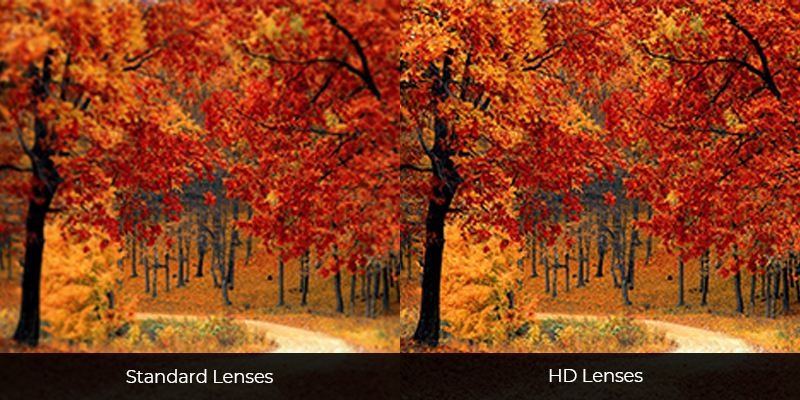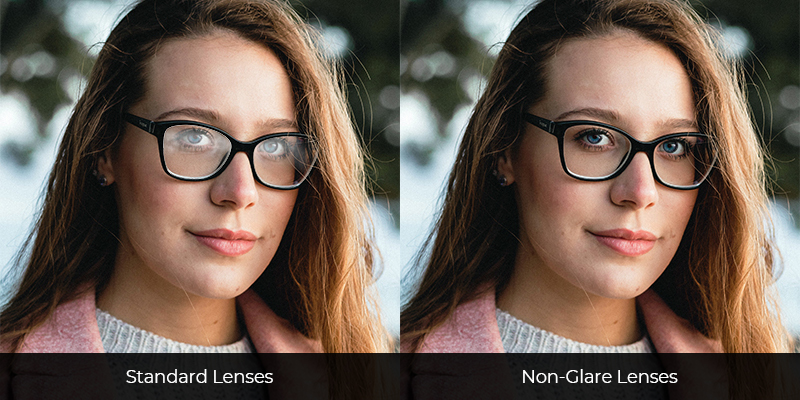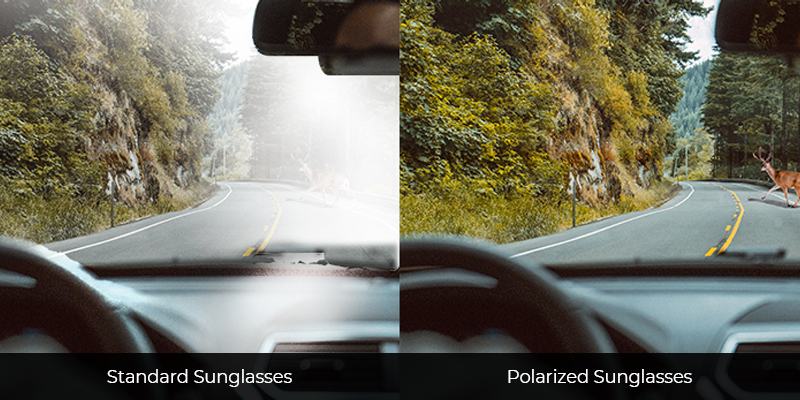What Are the Best Lenses for Me?
Eyeglass lenses come in many different options, and our opticians are highly skilled in helping you choose the best lens for your lifestyle and budget. We recommend high definition digital lenses to give the ultimate in visual performance. Whether for indoors, outdoors, or changing light conditions, high definition digital lenses provide the best visual acuity possible.
High Definition Lenses
In today’s high tech world many of you have heard the term “high definition.” The quality of a high definition lens is similar to the quality of a digital camera. They allow for sharper, clearer, crisper vision throughout the whole lens, giving you the best vision possible!

High Definition lenses are made of the same materials as conventional lenses. What makes digital lenses different is the process by which they are made. To create these lenses an advanced digital technology is used to resurface the lens allowing for greater precision over the entire lens surface. Surfacing the lenses this way provides you with more visual comfort, improved peripheral vision, sharper definition and less eye fatigue.
These lenses are ideal for all patients who want to experience the latest in lens technology, while those with high prescriptions and large amounts of astigmatism will experience the greatest wow factor. Watch the video below for more information and be sure to ask our optician about HD lenses!
Computer Lenses
Do you get headaches or eyestrain from staring at your computer monitor? At the end of a long day in front of your computer screen, is it difficult to focus on distant objects? You may be suffering from Computer Vision Syndrome (CVS). With most of the population working on computers for multiple hours a day, Dr. Pairolero and Dr. Langhorst want to share some educational information on Computer Lenses.

According to the American Optometric Association, 70-75 percent of computer workers experience eye and vision problems. This condition, known as computer vision syndrome, includes blurry vision, sore and tired eyes, and neck and shoulder pain. Nearsighted people often complain of headaches, eye strain, squinting or fatigue when driving, playing sports, or looking more than a few feet away.
Special computer task lenses can be used to supplement your primary pair of eyewear to solve computer specific vision requirements. For example, computer task lenses can help relieve the symptoms of computer vision syndrome by enhancing vision at the near and intermediate distances. With the added comfort of a more natural head position.
Ask your doctor for more information if you’re experiencing symptoms of computer vision syndrome.
Non-Glare Lenses
Non-glare lenses, also referred to as anti-reflective lenses, are specially calculated to eliminate the glare on your lenses and increase the amount of light entering your eye. This is an important safety benefit for driving at night as non-glare lenses reduce annoying reflections and halos around lights. Watch the video and be sure to ask our optician about non-glare lenses at your next visit!

Have you ever experienced blinding reflections in your lenses from oncoming traffic while driving at night? Non-glare lenses, also referred to as anti-reflective lenses, are specially designed to eliminate the glare on your lenses and increase the amount of light entering your eye. This is an important safety benefit for driving at night as anti-reflective lenses reduce annoying and dangerous reflections and halos around lights. These distracting glares can cause people to squint or look away, making driving unsafe. Non-glare lenses also improve the cosmetic appearance of your glasses by reducing the reflections that mask your eyes while someone is looking at you, making your eyes look more natural. Better yet, most premium non-glare glasses are easier to clean because they include a two-sided scratch-resistant coating that helps reduce smudges and collecting dust. Ask a staff member to demonstrate the benefits of a non-glare lens. You’ll be glad you did!
Progressive Lenses
Progressive lenses, sometimes referred to as no-line bifocals, are the most natural form of vision correction available. These multifocal lenses provide a full range of focus distance without any separations or interruptions from a lined segment meaning they look exactly like single vision lenses. They provide the ability to see at all distances, including arm’s length for computer use and up close for reading. These lenses are perfect to give you a more youthful appearance. Watch the video for more information and ask Dr. Pairolero or Dr. Langhorst about progressive lenses at your next appointment!
Progressive lenses, sometimes called no-line bifocals, give you a more youthful appearance by eliminating the visible lines found in bifocal and trifocal lenses. They provide the ability to see at all distances including arm’s length for computer use, and up close for reading.
Progressive lenses are the most natural form of vision correction available for patients with presbyopia as they eliminate the image jump present in standard bifocal and trifocal lenses. Progressive lenses provide a smooth transition from the distance through intermediate to near vision with all the in-between vision corrections needed. This constant graduation of the prescription means that you can look up to see the distance, look ahead to view things such as a computer in the intermediate zone, and drop your gaze downward to read and do fine work comfortably up close.
With so many progressive lens designs and options available today, the choices can be overwhelming without professional advice. Ask a staff member to see which lens is best for you.
Thinner & Lighter Lenses
Do you desire thinner, lighter-weight lenses? A variety of new plastic materials are available to provide thinner and lighter lenses. This means less lens material can be used to correct the same amount of prescription. In addition to looking thinner, your lenses will also reduce the magnified “bug-eye” or “coke bottle” look often caused by thicker lenses. Watch the video for more information and ask our optician what lens material is best for you!
Most of today’s eyewear choices are made of plastic or metal with rims thinner than the lens. Sometimes eyewear has no frame at all and has rimless mountings. In either case, the lens edges are highly visible, and thicker edges can detract from the appearance of your eyewear.
The good news is that a variety of new plastic materials are available to provide thinner and lighter lenses. This means less lens material can be used the correct the same amount of prescription. In addition to looking thinner, your lenses will also reduce that magnified bug-eye or “Coke bottle” look often caused by thicker lenses.
Ask a staff member about which lens material will be best and most comfortable for you.
Scratch Protection
For lenses that do not include an anti-reflective treatment, it is important to protect them with a scratch resistant treatment. Lenses that are treated on the front and backside with a clear, hard coating show increased resistance to scratching. A two-sided scratch resistant treatment is the best choice for optimal scratch resistant protection. Watch the video below and be sure to ask our optician about adding scratch protection to your lenses!
Although no lens material is “scratch-proof,” it’s important to protect your new lenses with a scratch resistant treatment.
Lenses with the best scratch protection are treated on the front and backside with a clear, hard coating to be scratch resistant. Some lenses have built-in scratch resistance. However, it’s important to know that not all scratch resistant treatments are equal, and not all treatments protect both the front and back surface of the lens. A two-sided scratch resistant treatment provides the best protection.
Ask an optician for more information on the best treatment for your lenses.
Sunglasses
To protect your eyes and your vision, it is important to wear sunglasses when outside enjoying the sunshine. Ask Dr. Pairolero or Dr. Langhorst to make sure your sunglasses provide 100% protection from UVA and UVB rays. Watch the video for more information on sunglasses and polarized lens options. Remember, you don’t need an appointment to stop in and check out our sunwear!
While sunlight is a beautiful thing, too much of anything can be harmful. Sunglasses can prevent sun damage to the eyes, improve vision, and make a unique fashion statement. Much like our skin becomes sunburned, over-exposure to the sun’s ultraviolet or UV radiation can cause a variety of eye problems including cataracts, macular degeneration, non-cancerous growth, and even cancer of the eye and eyelids.
To protect your eyes and your vision, it is important to wear sunglasses when outside enjoying to sunshine. Ask your eyecare professional to make sure your sunwear provides 100% protection from UVA and UVB rays.
Sunglasses are available with or without a prescription, and are often available with polarized lenses. Light reflected from surfaces such as a flat road or smooth water generally is horizontally polarized. Polarized lenses contain a special filter that blocks this type of intense reflected light, reducing glare for your eyes.

Polarized lenses have been popular for years with boaters and fishermen who need to reduce reflected glare from the water surrounding them. Outdoor enthusiasts who have also benefited the most from polarized lenses include skiers, bikers, golfers, and joggers, all who may enjoy a clear view with elimination of glare.






